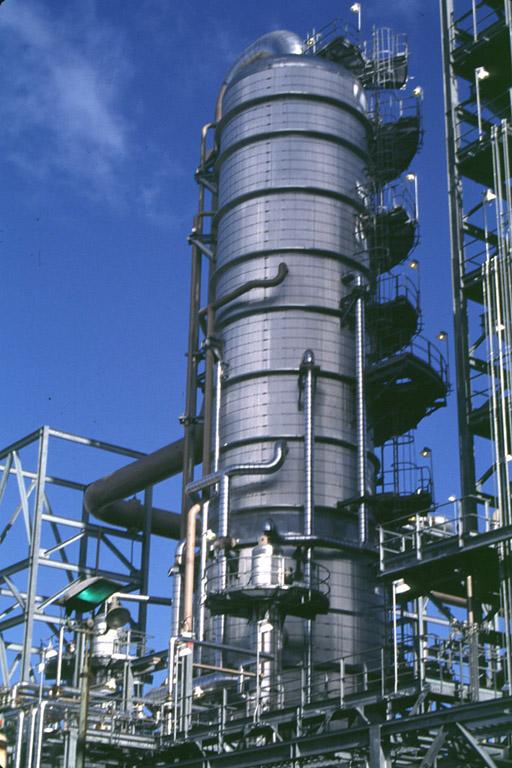In recent years, Nigeria has grappled with numerous challenges that have hindered it’s economic growth and development, one of the most pressing being its reliance on imported refined petroleum products. As Africa’s largest oil producer, the paradox of Nigeria’s frequent fuel shortages highlights the inefficiencies within its refining sector. In light of this, the emergence of a new refinery presents a pivotal opportunity for the nation to revitalize its economy.This article explores the meaning of this development, examining its potential to not only reduce dependency on imports but also to create jobs, stimulate investment, and ultimately foster a more self-sufficient and resilient energy landscape. By delving into the implications of the refinery’s establishment, we will uncover why this project is not merely an infrastructure upgrade but a critical step towards securing nigeria’s economic future.
The Current State of Nigeria’s Oil Industry and Its Challenges
Nigeria’s oil industry, once a beacon of prosperity, now grapples with a multitude of challenges that threaten its stability and profitability. Despite being one of Africa’s largest oil producers,the country faces issues such as regulatory uncertainty,aging infrastructure,and inefficiencies in refineries that have left it heavily reliant on imports for refined petroleum products. Corruption and militant activities in the Niger Delta region further exacerbate thes issues, leading to operational disruptions and loss of revenue. The country’s reliance on crude oil exports makes it particularly vulnerable to fluctuations in global oil prices, impacting goverment revenues and economic stability.
To combat these challenges and reinvigorate the sector, a new refinery is essential for Nigeria. Such a facility would not only facilitate greater refining capacity but also allow the country to meet its domestic fuel needs, reducing dependency on imported products. The establishment of a modern refinery could lead to numerous benefits, including:
- Job Creation: Development of local talent and employment opportunities.
- Economic Growth: Stimulating ancillary industries and local businesses.
- Energy Security: Ensuring a stable and reliable supply of fuel for the nation.
- Reducing Import Bills: Lowering the financial burden posed by fuel imports.

The Economic Impact of Importing Refined Petroleum Products
The dependence on imported refined petroleum products poses significant challenges to Nigeria’s economy. with a substantial portion of the nation’s revenue allocated to these imports, the financial burden frequently enough results in trade deficits and destabilizes the local currency. The high costs associated with importing fuel can lead to increased prices for consumers and businesses alike, impacting the overall cost of living. Moreover,the reliance on foreign refineries exposes Nigeria to global market fluctuations,making it vulnerable to sudden price surges and supply chain disruptions.
Establishing a new refinery could not only reduce these economic strains but also stimulate local industry growth. By producing refined petroleum products domestically, Nigeria could enhance its self-sufficiency and preserve foreign exchange reserves. Additionally, this move would create job opportunities within the refining sector and ancillary industries, promoting economic diversification. The potential benefits include:
- Reduced dependency: Decreasing reliance on imports can stabilize the economy during global fluctuations.
- Job creation: A local refinery would generate employment opportunities, boosting local economies.
- Investment stimulation: Attracting investment in the energy sector can lead to further infrastructure development.

Benefits of Establishing a New Refinery for Local Communities
The establishment of a new refinery can usher in a myriad of benefits for local communities, transforming both their economic landscape and the quality of life for residents. One of the most immediate effects would be the creation of job opportunities.A refinery would require a workforce for construction, operation, and maintenance, which could lead to the hiring of thousands from the local populace. Along with direct employment, ancillary jobs in sectors such as transportation, hospitality, and retail are likely to flourish consequently of increased local economic activity. Communities would thus experience a significant upsurge in household incomes, ultimately benefiting local businesses.
Moreover, the new refinery could enhance energy accessibility and affordability for nearby residents. By producing refined petroleum products locally, the dependency on imported fuels would diminish, possibly stabilizing fuel prices and improving supply consistency. Increased access to affordable energy would empower local enterprises and stimulate growth across various sectors, including agriculture and manufacturing. The environmental impact could also be mitigated through modern technologies that adhere to rigorous safety and sustainability standards, promoting a healthier living environment for the community.

Investment Opportunities and Partnerships in the refinery Sector
The refinery sector in Nigeria presents a multitude of investment opportunities for both local and international stakeholders. As the nation seeks to bolster its economy and achieve self-sufficiency in petroleum products, there are several avenues for collaboration and financial engagement.Potential investors can explore opportunities in:
- Private-Public Partnerships: Joint ventures with the government can facilitate capital investment while ensuring regulatory compliance.
- Technology transfer: Collaborating with established global operators can enhance efficiency and modernize existing facilities.
- Infrastructure Development: Investing in pipeline networks and distribution logistics to streamline operations and reduce costs.
- Renewable Energy Integration: Exploring avenues to incorporate green technology into refinery processes to meet sustainable goals.
Moreover, strategic partnerships can amplify the sector’s growth by uniting expertise, technology, and resources. Understanding the local market dynamics and regulatory environment is crucial for those looking to make significant economic contributions. An overview of potential investment benefits includes:
| Benefits | Description |
|---|---|
| Political Support | Government incentives for local refining initiatives. |
| Job Creation | Enhanced employment opportunities in the region. |
| Economic Diversification | Reduction of dependence on oil exports through local processing. |
| Innovative Solutions | Attracting cutting-edge technology for operational efficiency. |

Policy Recommendations for Supporting Nigeria’s Refinery Development
To effectively stimulate Nigeria’s refinery development, policymakers should consider a multi-faceted approach that focuses on regulatory, financial, and infrastructural enhancements. Streamlining the regulatory framework is crucial to reduce bureaucratic hurdles that frequently enough delay projects. This can be achieved by establishing a clear, transparent process for obtaining permits and licenses, ensuring that investors face minimal red tape. Moreover, offering tax incentives and financial subsidies can attract both local and foreign investors, promoting private sector participation in refining activities.
Along with regulatory improvements, fostering public-private partnerships (PPPs) can definitely help leverage private expertise and capital for refining projects. This approach can benefit from shared risks and improved efficiency. Furthermore, investing in infrastructural development, such as pipelines, roads, and storage facilities, is necessary to support the supply chain and distribution of refined products. Policymakers should also prioritize training and capacity-building programs to equip the workforce with the necessary skills, ensuring sustainable growth in the sector. The following table outlines potential initiatives to support refinery development:
| Initiative | Description |
|---|---|
| Regulatory Reform | Streamline processes for permits and licenses. |
| Financial Incentives | Tax breaks and subsidies for investors. |
| Public-Private Partnerships | Collaborate with private sectors to share risks. |
| Infrastructural Investment | Enhance pipelines, roads, and storage capabilities. |
| Training Programs | Equip workforce with relevant skills and knowledge. |

Long-Term Vision: Achieving Energy Independence and Economic Growth
The establishment of a new refinery in Nigeria is not merely an infrastructure project; it represents a pivotal step towards energy independence. Currently, Nigeria imports a substantial portion of its refined petroleum products, which burdens the economy with additional costs and reliance on external suppliers. By ramping up local refining capacity, the nation stands to benefit from several key advantages:
- Reduced Import dependency: A local refinery would diminish the need to import gasoline and other fuels, stabilizing the economy and conserving foreign exchange reserves.
- Job Creation: New refineries create thousands of jobs, both directly and indirectly, providing much-needed employment opportunities in a country with high unemployment rates.
- Boost to Local Industries: A reliable supply of locally refined products can support local businesses and industries, fostering greater economic growth throughout the region.
moreover,the refinery positions Nigeria to potentially become an export hub for refined products in the West african region. With a strategic focus on regional markets, Nigeria can leverage its geographic advantages and existing infrastructure to increase its influence in the global energy space. This can be achieved by:
- Competing in Export markets: Developing a robust refinery network enables Nigeria to export surplus refined products to neighboring countries, enhancing trade relations.
- Attracting Foreign Investment: A commitment to refining capabilities can attract foreign capital and technologies, further modernizing the sector.
- enhancing energy Security: By ensuring a stable supply of energy resources, the nation can minimize fluctuations in fuel prices and enhance overall energy security.

Wrapping Up
the establishment of a new refinery in Nigeria represents a critical step towards revitalizing the nation’s economy. With the potential to reduce reliance on imported fuel, create jobs, and foster local industries, this initiative could serve as a cornerstone for broader economic transformation.As Nigeria strives to harness its abundant resources and address longstanding energy challenges, the accomplished implementation of this refinery will not only enhance energy security but also signal to both domestic and international investors that Nigeria is committed to sustainable economic growth.As the nation navigates its path forward, the eyes of the world will be keenly focused on the outcomes of this ambitious project and its implications for the future of the Nigerian economy.







